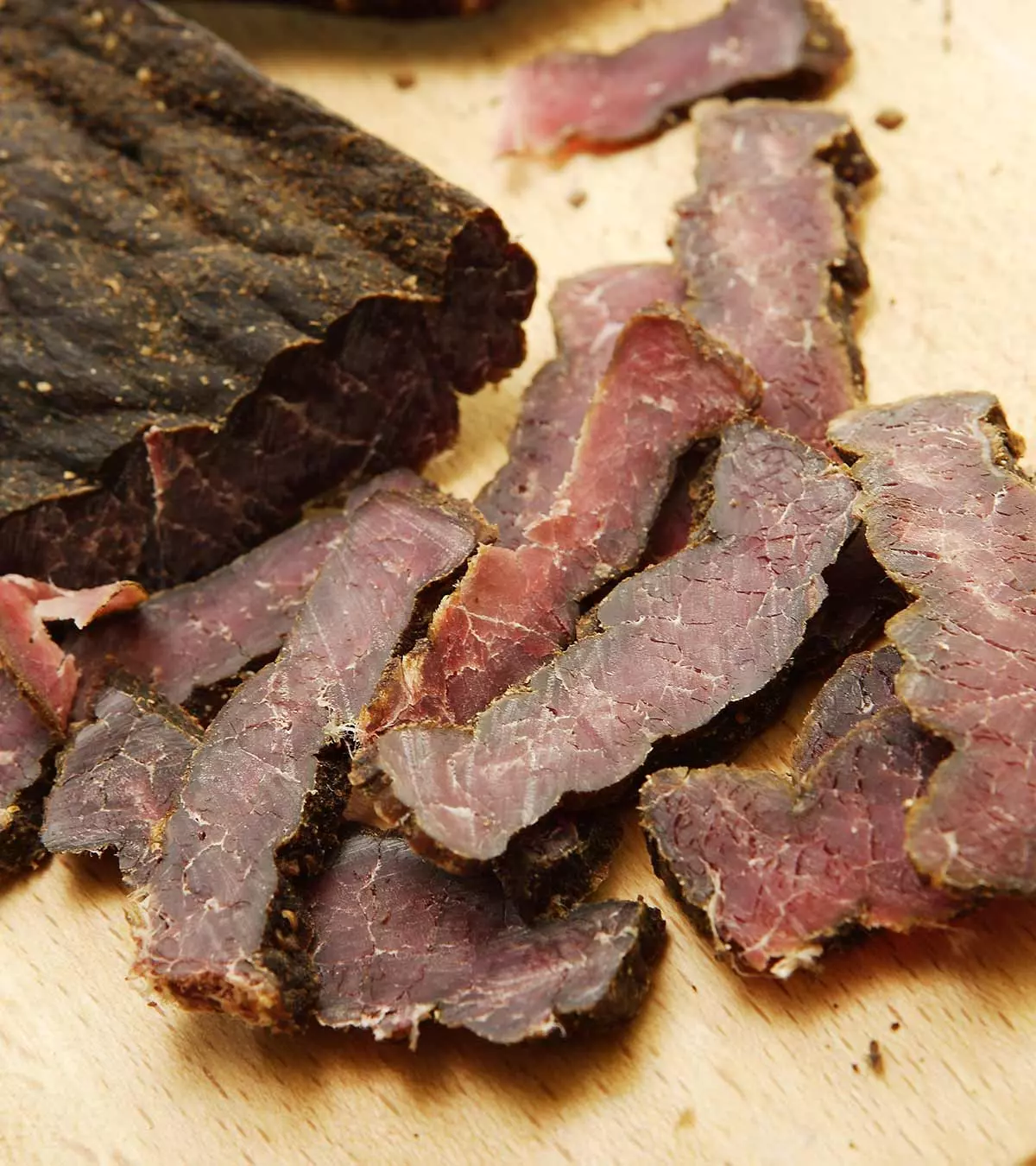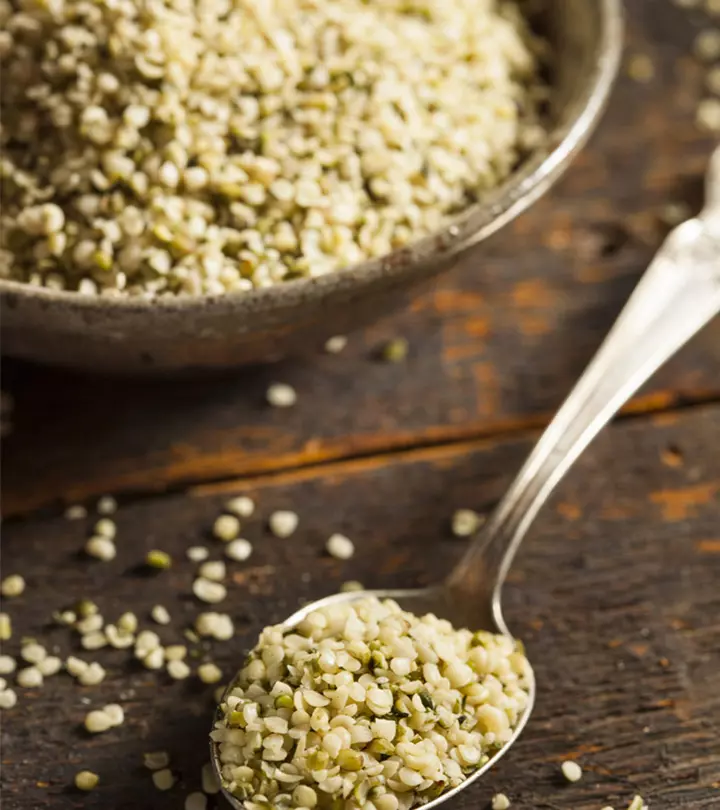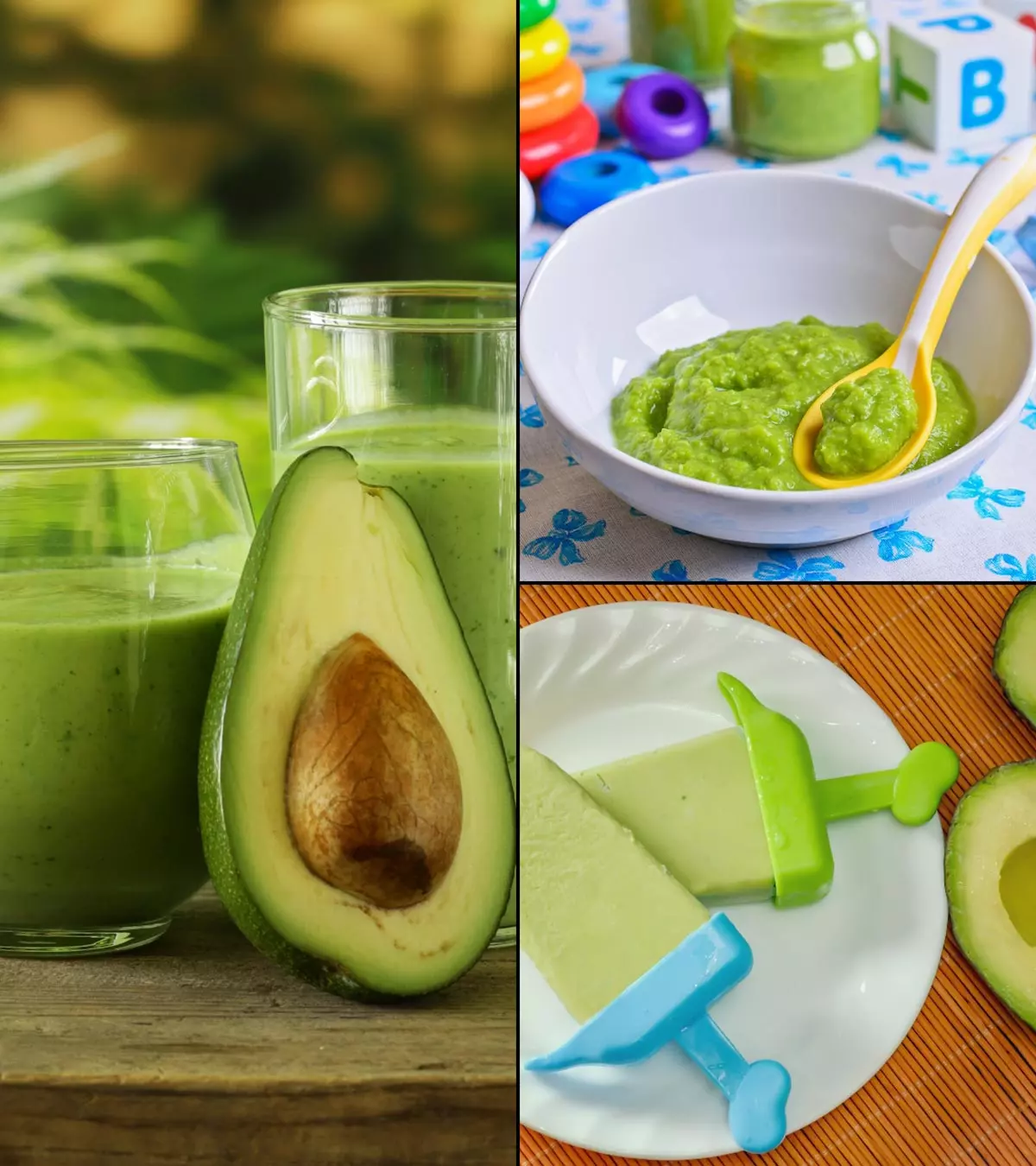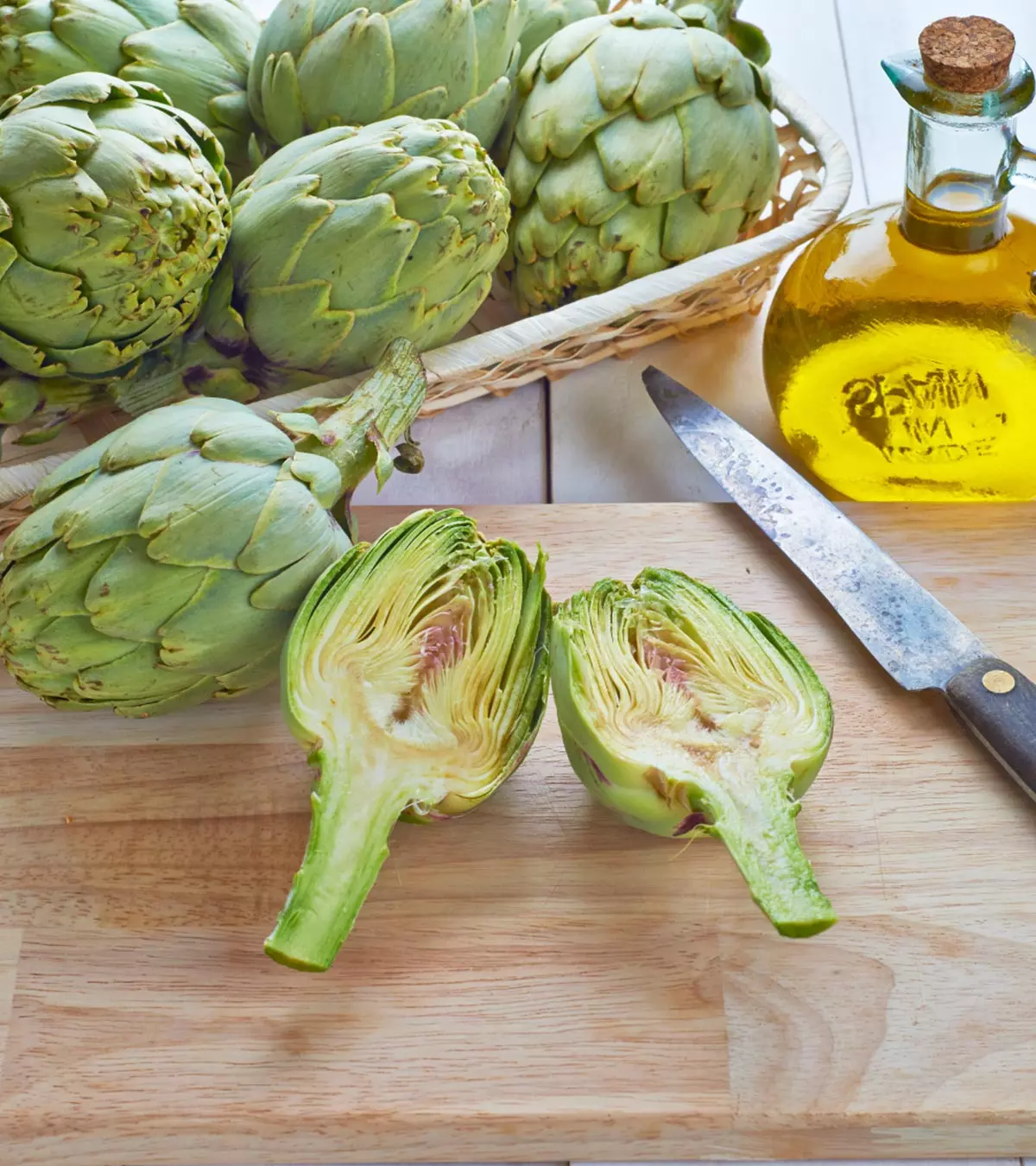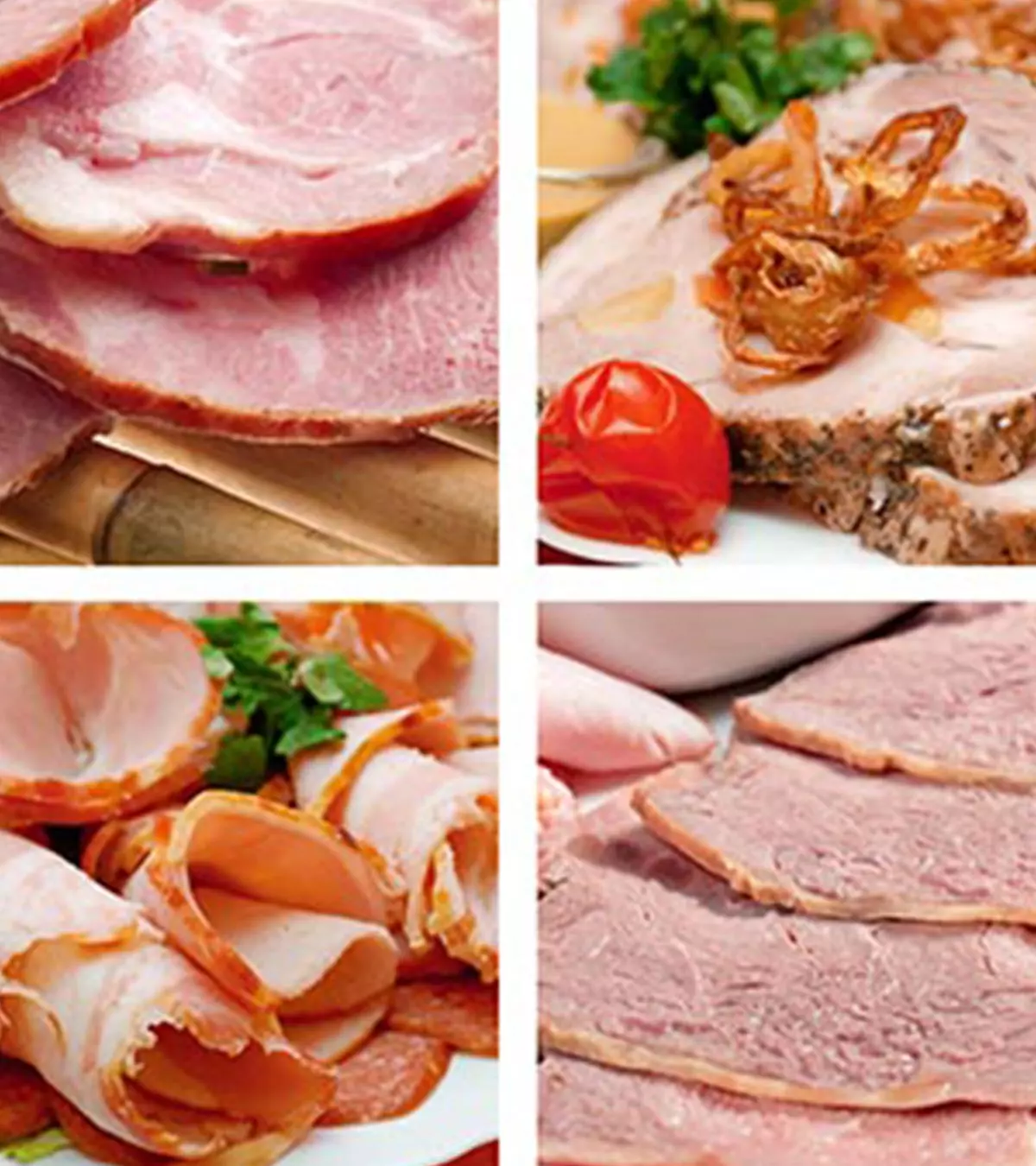
Image: ShutterStock
It is common to experience those crazy hunger pangs and cravings while pregnant, and you would want to try all sorts of foods, including deli meat. However, having deli meat during pregnancy may not be appropriate for some women. This cooked and sliced meat is prepared for light meals or sandwiches. There are three types of deli meats-first is the whole cut type, which is first cooked and then sliced. The second is the sectioned meat, restructured from pieces or chunks and put together to form one piece. And the third type is processed meat, which could be similar to the sectioned one but includes meat by-products. Deli meat could be a nutritious yet delicious option to control hunger pangs. But is it safe for pregnant women? Read this post to know more about the safety and precautionary measures before consuming deli meat during pregnancy.

Key Pointers
- Deli meat is safe for pregnant women if adequately refrigerated and cooked at 165°F.
- However, pregnant women should consume deli meats in moderation as they contain high saturated fat and salt content.
- Cured deli meats with a lot of salt and nitrates are best avoided during pregnancy.
- Pregnant women should avoid roasted beef, hot dogs, bologna, and sausages as they are deli foods that may pose a risk.
- To avoid contamination, pregnant women must be cautious while handling raw meats.
Is It Safe To Eat Deli Meat When You Are Pregnant?
According to New York-based certified nutritionist and dietician Reda Elmardi, “While it is generally safe to consume deli meats, it is still recommended to practice moderation.”
Deli meat is safe to eat as long as it is properly stored and thoroughly cooked (heated at 165°F) (1). Heating at such high temperatures ensures complete killing of the bacteria.
However, deli meats are high in saturated fats as well as sodium and should be consumed in moderation during pregnancy. Also, be careful while handling raw meats so as to prevent them from getting contaminated by parasites and bacterias such as listeria, toxoplasma, and salmonella, which can pose a risk during pregnancy (2).
Deli meats are usually processed meats that get exposed to the environment and the bacteria during packaging.
The following section lists the deli meats you can safely consume during pregnancy.
What Kind Of Deli Meat Is Safe To Eat During Pregnancy?
Elmardi says, “Opt for fresh, high-quality options, limit your intake, and balance it with other nourishing food choices. Deli meats, such as turkey, chicken, ham, and roast beef, offer various nutritional benefits. They are a good source of protein, vitamins (B12, B6), and minerals (iron, zinc). Incorporating them in a balanced diet can contribute to meeting the essential nutrient requirements during pregnancy.”
The safest deli meats to have during pregnancy include:
- Turkey breast: It is low in calories and high in protein content. It helps lower blood sugar and cholesterol.
- Deli sliced ham: It is rich in proteins and calories. A ham sandwich with lettuce and cucumber makes a good option to satisfy your hunger.

- Chicken breast: It is one of the healthiest protein options to consume during pregnancy.
- Grilled pork slices: They are a good source of protein, calcium, and energy, with high satiety value making it suitable for pregnancy.
What Deli Meats To Avoid During Pregnancy?
Here is a list of deli meats that you need to stay away from during pregnancy.
- Deli meats that are cured with high salt and nitrates should be avoided. Excessive salt can lead to hypertension and edemaiSwelling in the body parts due to extra fluid buildup , whereas nitrates are carcinogeniciA substance or property capable of causing cancer and can have adverse effects. If you still want to have them, make sure to eat in moderation.
- Avoid deli meat products such as hot dogs, roasted beef, bologna, and sausages as there is ambiguity about the storage and cooking method of these meats also they are high in sodium. If you want to have these foods, make sure to heat them at 165°F at least before consumption.

Deli meats are usually sold as raw ingredients, but can also be included in certain foods sold outside.
Foods That Contain Deli Meat
Here is the list of foods that contains deli meat:
- Chorizo: It is a cured Spanish sausage made from pork and flavored with black pepper, garlic, and smoked paprika. It can be stored in the freezer for five days, in an airtight container.
- Pancetta: The Italian bacon is made from pork belly. It is dry-cured with salt and condiments and aged for three months. It should be stored in the fridge and consumed within four days after the package is opened.
- Prosciutto: Made from pork legs, it is similar to pancetta. Prosciutto is cured in salt and is aged for nine to 18 months and even up to three years in cold climates. Once opened, refrigerate it and consume within two days.
- Ham off the bone: Dry-cured with salt mixture, the pork leg is then smoked and left to air-dry and mature.
- Pepperoni: It is a spicy, cured sausage made from beef or pork or a mixture of both. It is flavored with spices and pepper. It can be stored by wrapping in plastic and can stay fresh for up to two weeks when refrigerated.
- Mortadella: The sausage is made by combining pork fat, minced pork, peppercorns, pistachios or olives. You can store it in an airtight container and refrigerate for two days.
- Chicken rolls: Made from chicken meat, it is seasoned and baked. Store it in an airtight container for up to two days.
- Salami: The sausage undergoes curing by salting, drying, smoking or fermenting. It is made from beef, pork or veal. It can be stored in the fridge for two days, in an airtight container.
- Chicken breast supreme: It is made from chicken breast fillets that are pressed and then steamed. You can store it for two days when refrigerated.
- Beef pastrami: Pastrami is corned beef, which is coated with spices and smoked to render a unique flavor. It can be stored in the fridge for two days, in an airtight container.
- Turkey breast: This oven-roasted meat is low in fat, which makes it an excellent option for lunch. You can store it in the fridge for two days, in an airtight container.
- Roast beef: The beef is roasted in the oven and then cut into slices. It can be stored up to two days in the fridge, in an airtight container.
While having deli meats, you need to follow some safety precautions to reduce the risk of bacterial infections such as listeria.
How To Avoid Listeria From Deli Meats?
To avoid contracting the listeria bacteria from deli meats:
- Heat the deli meats over a stove until they are steamed, or cook in a microwave at a high temperature (165°F) to kill the bacteria.
- Do not keep the deli meat with other meats or fruits and vegetables, because the bacteria can spread.
- Wash your hands after handling and eating deli meat.

- If you have deli meats in a restaurant, then ensure that the food is served steaming hot.
- Be sure to sanitize cutting boards and utensils used for deli meats to prevent cross-contamination with other foods.
- Do not eat refrigerated food directly. Heat it before consumption.
 Did you know?
Did you know?If you get infected by listeriosis, you may start showing specific symptoms.
Listeriosis Symptoms To Look For If You Eat Deli Meat In Pregnancy
According to the Centres for Disease Control and Prevention, Listeriosis is estimated to infect 1,600 people yearly, of which there are approximately 260 mortalities. Listeria bacteria can stay alive even in cold temperatures. Animals fed on contaminated food become the carriers of these bacteria and pregnant women, who usually have low immunity levels, are more susceptible to listeriosis. The risk of catching this infection is the highest during the third trimester.
Some of the symptoms of listeriosis include (3):
- Headaches

In extreme cases one can develop meningitisiInflammation of the membrane or fluid covering the brain and spinal cord and septicaemiaiA serious disease caused due to the entry of harmful bacteria and their toxins into the bloodstream , also some may need hospitalization. If you notice these symptoms, stop deli meat consumption and contact your doctor right away.
Relation Between Listeriosis And Deli Meat During Pregnancy
The listeria outbreak in the year 1998 was linked to deli meats. The FDA’s risk assessment for Listeria has found that 85% of the cases are due to the consumption of deli meat, which put them under the very high-risk food category (4).
However, the FDA has guidelines for safe use of meats to reduce the chance of infection and make deli meats safe to eat during pregnancy.
 Quick tip
Quick tipIt is also necessary for you to take some measures while choosing the deli meats. We tell you about it next.
Tips To Choose Healthy Deli Meats
Here are a few simple tips to help you choose the right kind of deli meats:
- Fresh is best. Have freshly cooked sliced meat without any preservatives or add-ins.
- Lean meats such as ham, turkey, chicken, lean beef roast. They are low in calories and good sources of low fat.
- Organic deli meats. Meat sourced from animals that are grass-fed and not injected with any growth hormones or antibiotics is the best option during pregnancy.
- Low salt deli meat: Always consider low-sodium options to keep your sodium levels under check (5). It prevents issues such as hypertension and water retention during pregnancy.
- Go for nitrite-free ones: Nitrates, being carcinogenic, can lead to health issues. They are added to meats to give them a red and fresh look. If you are taking the packaged deli meat that contains nitrites or nitrates, be sure to limit the quantity.
- Store meats for not more than three days: This helps to prevent any risk of food poisoning. Make sure to keep the meat in an airtight container and discard the leftover meat if it is more than three days old (6).
Excessive consumption of deli meats may pose some health risks to the mother and the baby.
Possible Side Effects Of Deli Meats While Pregnant
Here are some side effects of having deli meats during pregnancy:
- Listeriosis: Listeria causes listeriosis that can lead to meningitis or severe blood infections . It can even pass through the placenta, leading to miscarriages, preterm labor, stillbirth, or other issues such as blood or brain infection and lifelong issues like seizures, paralysis, and intellectual disability in the infant (3).
- Effect on blood pressure: Deli meat processing involves the use of salt . Intake of excess deli meats can increase the level of sodium in the body, leading to hypertension, which can result in miscarriage or preterm labor (5).

- Heart problems: Deli meats are a good source of saturated fats that can lead to an increase in the cholesterol levels (7). The excess fat can obstruct the blood flow by constricting the blood vessels, causing heart problems.
- Obesity: They are high in saturated fats and calories and excess consumption can add to your weight. Obese women need to be careful with the consumption of deli meats during pregnancy.
- Preservatives: Nitrates are one of the toxic preservatives usually used during the curing process of deli meats. They are known for their carcinogenic effect.
If you are planning to have cold cuts, then avoid deli meats during pregnancy to keep the calories in check. Also, heat the cold cuts to the recommended temperature before consumption (2).
Pregnancy-Safe Alternatives Of Deli Meat
Here are a few healthier and pregnancy-safe alternatives to deli meat that you can include in your prenatal diet (8).
- Turkey: Instead of using deli meat in your daily sandwich, opt for freshly prepared turkey slices and savor the goodness.
- Ham: Choose freshly baked ham as a delicious and safe substitute for deli meat during pregnancy.
- Chicken: Have a healthy, homemade chicken rather than store-bought deli meat-containing salads.
- Eggs: For protein-packed options, go for a poached egg, sunny-side-up, or scrambled egg instead of pre-made deli meat.
Keep reading for answers to a few commonly asked questions about deli meat consumption during pregnancy.
Frequently Asked Questions
1. How hot should deli meat need to be when you consume it?
The recommended temperature is 165°F (74°C). Have steaming hot deli meats to make sure that the meat is free of any bacteria.
2. In which trimester can you safely eat deli meat?
Deli meats can be eaten any time during pregnancy provided they are cooked thoroughly.
3. Does craving deli meat during pregnancy say something about baby gender?
According to old wives tales, a craving for salty and spicy foods indicates a boy while longing for sweet indicates a girl. Since deli meats are salty, it can be assumed that you are carrying a baby boy. However, there is no scientific evidence to prove these claims.
4. Is it okay to eat refrigerated, cooked deli meat when pregnant?
Yes, but cooked and refrigerated deli meats must be reheated before consumption to kill any bacteria that the meat is exposed to in the environment.
5. Is it safe to eat packaged deli meat during pregnancy?
Yes. Packaged deli meats are processed meats and can be consumed after heating as recommended. The recommended refrigerator storage temperature for open packaged deli meat is 40°F or below. If stored in the freezer at a temperature of 0°F or below, you can use it for 1 to 2 months (6).
Limiting deli meats during pregnancy is recommended due to its high sodium and saturated fat content. You may store and cook deli meat as per the recommended safety standards to avoid food-borne bacterial infections such as listeriosis. You may eat deli meat in any trimester if it is cooked thoroughly. It is better to opt for low-calorie daily meats such as turkey breast or chicken breasts than hot dogs or sausages, which are among the foods to avoid during pregnancy. Consult your doctor immediately if you feel uneasy or have any side effects after consuming deli meat.
Infographic: Alternatives To Deli Meats
Deli meat makes for a quick ingredient in various dishes and renders a unique flavor. But, it is better to choose their alternatives during pregnancy. We have prepared a list of such ingredients that do not require you to compromise on excellent taste. Illustration: Momjunction Design Team
Illustration: Reasons Why It Is Unsafe To Have Deli Meats In Pregnancy

Image: Dall·E/MomJunction Design Team
Concerned about food safety during pregnancy? Check out this video and unlock insights into listeria, soft cheese, deli meat, and sushi, arming yourself with the knowledge to keep your meals secure. Explore the significance of washing produce and more!
References
- FOOD SAFETY For Pregnant Women Their Unborn Babies and Children Under Five.
https://www.fda.gov/media/83740/download - Prevention.
https://www.cdc.gov/listeria/prevention/?CDC_AAref_Val=https://www.cdc.gov/listeria/prevention.html - Listeria and Pregnancy.
https://www.acog.org/womens-health/faqs/listeria-and-pregnancy - Cantaloupe and Listeria: An Estimated 85% of Cases Are from Deli Meats Not Melons.
https://nutritionfacts.org/blog/cantaloupe-and-listeria-an-estimated-85-of-cases-are-from-deli-meats-not-melons/ - High Blood Pressure During Pregnancy.
https://www.marchofdimes.org/find-support/topics/pregnancy/high-blood-pressure-during-pregnancy - Cold Food Storage Chart.
https://www.foodsafety.gov/food-safety-charts/cold-food-storage-charts - Saturated Fat.
https://www.heart.org/en/healthy-living/healthy-eating/eat-smart/fats/saturated-fats - Lunch Break: Healthy Alternatives to Deli Meats.
https://www.urmc.rochester.edu/news/publications/health-matters/lunch-break-healthy-alternatives-to-deli-meats - How Listeria Spread: Deli Foods and Prepared Meats.
https://www.cdc.gov/listeria/causes/deli-ready-to-eat-foods.html?CDC_AAref_Val=https://www.cdc.gov/listeria/prevention.html - Listeria Outbreak Linked to Meats Sliced at Delis.
https://www.cdc.gov/listeria/outbreaks/delimeats-7-24.html?CDC_AAref_Val=https://www.cdc.gov/listeria/outbreaks/delimeats-7-24/index.html
Community Experiences
Join the conversation and become a part of our nurturing community! Share your stories, experiences, and insights to connect with fellow parents.
Read full bio of Dr. Shikha Sharma
- Reda Elmardi is a registered dietician, certified nutritionist, and a certified strength and conditioning specialist trainer. He is the owner of Activbuilt.com.
 Reda Elmardi is a registered dietician, certified nutritionist, and a certified strength and conditioning specialist trainer. He is the owner of Activbuilt.com.
Reda Elmardi is a registered dietician, certified nutritionist, and a certified strength and conditioning specialist trainer. He is the owner of Activbuilt.com.
Read full bio of shreeja pillai
Read full bio of Swati Patwal
Read full bio of Dr. Joyani Das






